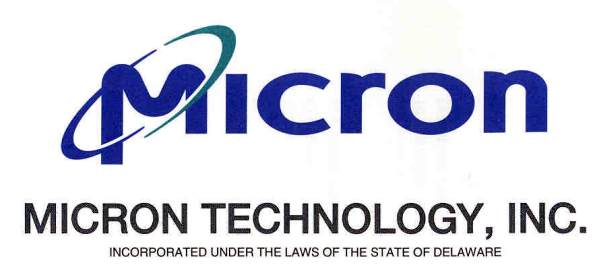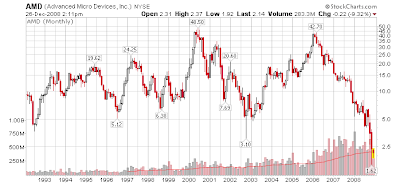Mish describes how the financial tsunami spreading throughout the global economy is taking the technology sector with it.
When The Chips Are Down, Chipmakers Resort To Other Means
Courtesy of Mish
Economic pain that has been hitting the financial economy and the brick and mortar retailers is hitting Silicon Valley as well. Many chip companies are short of cash and layoffs are increasing. Let’s kick off the review with Hynix Gets 800 Billion Won Aid Package From Creditors.
Hynix Semiconductor Inc., the world’s second-largest maker of computer memory chips, gained 800 billion won ($590 million) of financial support from creditors to stay in business as falling prices threaten a record loss at the company.
Controlling shareholders will provide 500 billion won in fresh loans and extend the maturity of Hynix’s debt until the end of 2009, main creditor Korea Exchange Bank said today. Ichon, Korea-based Hynix will also sell 300 billion won of new stock on the market that creditors will buy if unsold, Korea Exchange said.
Hynix’s creditors have pumped in fresh funds in hopes of recouping the remainder of their $4.6 billion bailout of the chipmaker this decade by selling their stake when the industry recovers.
"With additional funding and a recovery in the second half of next year, the possibility of a liquidity crisis at Hynix is pretty low compared to smaller rivals," Kim Young Chan, an analyst at HMC Investment Securities Co., wrote in a report yesterday. Kim, who has a "buy" rating on Hynix, projects the chipmaker will return to profit in the third quarter of 2009.
The company held about $1 billion in cash as of Sept. 30, Daiwa Institute of Research Ltd. estimated this month. Still, Hynix had net debt of $5.5 billion at the end of September, the most among the eight biggest computer-memory makers, Daiwa said.
Prices of the benchmark dynamic random access memory chip have fallen 59 percent this year to below the cost of production. The DRAM glut will probably persist throughout next year, UBS AG and JPMorgan Chase & Co. predict.
Anyone predicting a recovery in the second half of the year is not thinking too clearly. Extending more loans is throwing good money after bad. Rampant overcapacity needs to be reduced by some means. With that in mind, consider the plight of Micron (MU).
Micron Loses Money Every Quarter For Two Years
Bloomberg is reporting Micron Loss Doubles as Chip Demand Ebbs; Shares Fall
Micron Technology Inc., the top U.S. producer of memory chips, posted a wider first-quarter loss than analysts anticipated after falling prices forced it to write down the value of its inventory. The shares plunged in late trading.
The net loss more than doubled to $706 million, or 91 cents a share, Boise, Idaho-based Micron said today. Analysts surveyed by Bloomberg had estimated a loss of 45 cents a share. Sales sank 8.7 percent to $1.4 billion in the period, which ended Dec. 4.
The report marks Micron’s eighth consecutive quarterly loss as chipmakers battle falling prices and shrinking demand in the recession. The company wrote down $369 million in inventory that had lost value. Even today’s rock-bottom prices for dynamic random access memory, the main memory in personal computers, are failing to entice buyers, said Gary Hsueh, an analyst at Oppenheimer & Co. in San Francisco.
“People just aren’t buying PCs right now,” said Hsueh, who expects Micron shares to perform in line with their peers and doesn’t own any. “It’s not like you’ll sell more DRAMs at a lower price.”
Average selling prices for DRAM dropped 34 percent last quarter, Micron said. The price of its flash chips, used in portable electronics, dropped 24 percent.
Inquiring minds just might be asking what kind of salaries are being paid to Micron (MU) executives for the stunning achievement of losing money every quarter for 2 years. Yahoo!Finance has the answer.
Micron has $1.36 billion in cash and $2.73 billion in debt. At the current burn rate, Micron is on the deathbed.
AMD Monthly Chart
One quick look at the chart of chipmaker AMD is all you need to see to understand how badly things are going.
click on chart for sharper image
Inquiring minds might be interested in just how well AMD executives are being paid for this level of non-performance so here is the answer.
Seems to me we have more than a little mismatch between performance and pay.
The AMD’s Corporate Profile shows AMD has $1.34 billion in cash on hand ($2.2 a share) which means the company is trading for close to cash on hand. However, AMD has $5.23 billion in debt and is burning cash at the current rate of $127 million per quarter per its Third Quarter 2008 Statement.
AMD had a golden opportunity to raise cash when it was trading at $40, $30, $20, or even $15. It is now cash poor and relatively deep in debt, trading at $2.20. Management ought to be shot not rewarded for this.![]()
Silicon Valley Firings Increase
Silicon Valley Braces for Firings as Technology Outlook Worsens
Silicon Valley, the technology mecca once considered immune to fallout from the global financial meltdown, now faces the biggest cutbacks since the dot-com crash.
“Lots of my friends have been laid off,” Peter Raulwing, a project manager for Microsoft Corp., said during lunch at a Starbucks in Palo Alto, California. “I absolutely watch what I spend. I feel lucky I’ve survived, but you never really know.”
“The recession finally reached Silicon Valley,” Stephen Levy, the Palo Alto-based research organization’s director, said in an interview. The center based its conclusions on government unemployment data.
Technology companies with headquarters in Silicon Valley — a corridor of office parks stretching between San Francisco and San Jose — have announced at least 38,000 job cuts since September. Hewlett-Packard Co., Yahoo! Inc., Adobe Systems Inc., Sun Microsystems Inc. and Palm Inc. are among the firms paring their workforces.
Trip O’Dell is counting on that network. He and 600 colleagues at Adobe, the biggest maker of graphic-design programs, lost their jobs this month. With a 2-year-old daughter and another baby on the way, O’Dell plans to create games for Apple Inc.’s iPhone or develop applications for Facebook Inc.’s social-networking site.
“The benefit of being on the wrong side of a layoff is you have access to all these others with talent who suddenly have a lot of time on their hands,” said O’Dell, 35. There are still opportunities for people who use personal networks to find new jobs and start companies, he said.
Silicon Valley’s workers will have to spend more time networking next year as companies continue to cut jobs, Challenger said.
“The first quarter is going to be rough waters,” Challenger said. “The strength of the workforce lies in their flexibility, and how they use their knowledge of each other.”
I cannot think of a worse time in history to be starting a business. I see no benefit to being "on the wrong side of a layoff". Jobs are going to be next to impossible to find at salaries approaching what everyone laid off was making.
Apple iPhones At Wal-Mart
The Wall Street Journal is reporting Wal-Mart to Start Selling iPhones.
Wal-Mart Stores Inc. said Friday it will begin selling Apple Inc.’s iPhone 3G on Sunday, but the cellphones will not be priced as low as some anticipated.
Wal-Mart will offer the eight-gigabyte iPhone 3G for $197 and the 16 GB model for $297, or $2 less than the regular price. Prices are for phones with a new two-year service agreement with AT&T Inc. or with a qualified upgrade, the retailing giant said in a brief statement on its Web site.
Reports that Wal-Mart would begin selling the phones, previously available only at Apple stores, Best Buy Co. Inc. and AT&T, have been circulating for weeks, but the retailer hadn’t commented. Many of those reports indicated the phones might be priced as low as $99, but Wal-Mart made no mention of such discounts on Friday.
 It appears to me that Apple is getting a bit desperate to move those iPhones. Striking a deal with Wal-Mart smacks of huge inventory and shrinking demand. So, there’s no way in hell those prices stay at $197. $99 here we come.
It appears to me that Apple is getting a bit desperate to move those iPhones. Striking a deal with Wal-Mart smacks of huge inventory and shrinking demand. So, there’s no way in hell those prices stay at $197. $99 here we come.
Plunging Profits and Stock Prices of Zero
Smart Money is talking about Plunging Profits and Stock Prices of Zero.
The fourth-quarter earnings reports are going to be miserable. Consider this: Over the past two weeks — not counting Friday — I posted 65 news items on my Tech Trader Daily blog in which the subject of the story issued an earnings warning, laid people off, threatened to go bankrupt or otherwise offered grim tidings on current financial conditions. That’s about seven earnings warnings a day, and that doesn’t count the misery outside of the tech sector. But that’s not all bad: The more warnings we get, the fewer nasty surprises the Street should receive when actual numbers show up in mid-January…right? Well, yeah…except that we’ve now started to see some companies double dip on warnings. This is a particular risk for chip companies that provided guidance back when reporting Q3 earnings in October. Sadly, conditions seem to have actually worsened in the past few weeks. And in fact…
If you thought the fourth quarter was bad, wait until you see the first quarter. It’s almost always true in the tech sector that Q1 is the worst quarter of the year, and Q4 is the best. This year, it may be that even after an unthinkably bad fourth quarter, the first quarter will be nastier still.
 PC and mobile-phone sales could be even worse than most people imagine. Peter Misek, an analyst with Canaccord Adams, last week predicted that ’09 PC sales are likely to be down 10%-15%, much worse than the consensus view of down 5%-6%, and that mobile-phone sales are likely to be down as much as 20%, rather than the 4%-6% decline the Street expects.
PC and mobile-phone sales could be even worse than most people imagine. Peter Misek, an analyst with Canaccord Adams, last week predicted that ’09 PC sales are likely to be down 10%-15%, much worse than the consensus view of down 5%-6%, and that mobile-phone sales are likely to be down as much as 20%, rather than the 4%-6% decline the Street expects.
Some familiar names are not going to get out of 2009 in one piece. Already, some companies seem to be teetering on the edge of the precipice. It may take a cash infusion from the German government to keep DRAM maker Qimonda (QI) from going bankrupt; Taiwan’s government is going to intervene to keep its own memory companies alive. Charter Communications (CHTR), the debt-ridden Paul Allen cable operator, has opened talks with holders of its $21 billion in debt in hopes of recapitalizing the company; equity holders could get wiped out. Nortel (NT) recently hired bankruptcy lawyers. The aforementioned Misek last week picked up coverage of Palm (PALM) with a Sell rating and a price target of zero. The list of companies in peril is long: Advanced Micro Devices’ (AMD) planned turnaround is going to be an uphill struggle in a world of shrinking PC demand. Can Motorola (MO) ever fix its handset business? Can Sirius XM (SIRI) survive without restructuring? So here’s my advice… Despite it all, have a happy New Year.
When the Chips are Down, there’s always one gambit remaining, and so here it is….
Chipmakers Hire Armies of Lawyers
Bloomberg is reporting Chipmakers Hire Armies of Lawyers to Boost Revenue.
Chip companies are turning to armies of patent lawyers to bolster revenue amid the worst market for semiconductors since 2001.
Qimonda AG, LSI Corp. and Spansion Inc. are among the chip companies using the U.S. International Trade Commission in Washington to try and block imports of rival products or garner patent royalties. The government agency has started investigating 42 intellectual-property complaints this year, the most since 1983.
“Lawyers are expensive, particularly patent lawyers in Silicon Valley, but it’s a great area to get money,” said Hans Mosesmann, a semiconductor analyst for Raymond James & Associates in New York. “You’re going to see more litigation and more aggressive maneuvering.”
Chipmakers, already reeling from plunging prices caused by overproduction, now face falling demand. Chip sales slid 4.4 percent this year, and will slump 16 percent in 2009, the first back-to-back decline on record, according to research firm Gartner Inc. in Stamford, Connecticut.
Spansion could bring in “hundreds of millions of dollars a year” in licensing revenue from patents, Chief Executive Officer Bertrand Cambou said. The company, which hasn’t made a profit since going public in 2005 and doesn’t reveal how much it collects in licensing, filed a patent-infringement complaint last month against South Korea’s Samsung Electronics Co. after licensing talks failed.
LSI, based in Milpitas, California, is in the midst of a battle with rivals Freescale Semiconductor Inc., Cypress Semiconductor Corp. and Elpida Memory Inc. LSI says the companies violated its patent for making semiconductors using tungsten metal.
Eastman Kodak Co., the 128-year-old photography company, has a pending case against Samsung and LG Electronics Inc. over camera-phone technology. Microsoft Corp., the world’s biggest software maker, went to the ITC to push a licensing agreement with Taiwan’s Primax Electronics Ltd. over technology used in computer mice. The case was settled Dec. 17.
It’s interesting that Rambus was not mentioned in the article. They are always involved in litigation with generally everyone. But not so fast. A quick check of the news finds recent news on Rambus.
Hynix, Micron Concede Infringement in Rambus Dispute
There is almost always recent news on Rambus litigation, and here it is: Hynix, Micron Concede Infringement in Rambus Dispute.
Hynix Semiconductor Inc. and Micron Technology Inc. said they won’t fight claims they infringe some patents owned by Rambus Inc. to instead focus on trying to invalidate the patents in a trial next month.
They, along with Samsung Electronics Co. and Nanya Technology Corp., announced the decision in a filing today in federal court in San Jose, California. The companies said the decision to not contest any remaining infringement issues won’t affect their arguments concerning damages or the validity of the Rambus patents for high-speed memory chips.
Rambus, which designs chips called dynamic random access memory, or DRAM, for computers, sued the companies after they refused to pay patent royalties. The trial is scheduled to begin Jan. 19 and the companies asked that, because of their decision, they be allowed to present their case first to the jury.
“Micron and the other DRAM manufacturers have elected for strategic purposes to focus the jury’s attention on the invalidity of Rambus’ patents,” said Dan Francisco, a spokesman for Boise, Idaho-based Micron.
The dispute between Micron and Rambus has been going on since 2000. Will Micron even be in business long enough for Rambus to collect anything?
Chipmaker Value Trap
 It’s certainly far too late to be shorting most if not all of these name. Some even look tempting on the basis of cash on hand. But one also needs to look ahead at demand and cash on hand. Demand is falling off the cliff and cash on hand is dwindling thanks to rising litigation expenses, stock options, and unwarranted salaries.
It’s certainly far too late to be shorting most if not all of these name. Some even look tempting on the basis of cash on hand. But one also needs to look ahead at demand and cash on hand. Demand is falling off the cliff and cash on hand is dwindling thanks to rising litigation expenses, stock options, and unwarranted salaries.
Don’t pull a "Legg Mason" thinking there are tremendous buys based on book value and projected earnings that will likely be non-existent.
Phones are not coming back, nor are PCs, games, or any electronic devices with chips. And many countries are acting to keep their chipmakers in business. That ensures the glut of chips will continue unabated.
Some of these companies may be trading at book value, but those book values are falling fast. This recession will be longer and deeper than most think, and "values" are likely to become "bigger values". Caution is in order.





